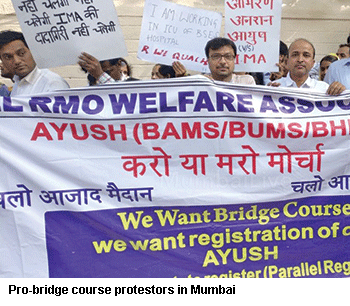Maharashtra: Cross-practice controversy
 WHILE NATIONWIDE PROTESTS by doctors forced the BJP-led NDA government at the Centre to drop the controversial s.49 (4) of the National Medical Commission Bill, 2017, which permitted practitioners of alternative medicine (ayurveda, unani etc) to prescribe basic allopathic medicines after completion of a ‘bridge course’, Maharashtra’s BJP government continues to back ‘cross-practice’ by alternative medicine practitioners. Government and private colleges in Maharashtra have been teaching a 12-month modern pharmacology bridge course since the academic year 2016-17. Recently, an additional 1,200 students have been admitted into the course beginning August.
WHILE NATIONWIDE PROTESTS by doctors forced the BJP-led NDA government at the Centre to drop the controversial s.49 (4) of the National Medical Commission Bill, 2017, which permitted practitioners of alternative medicine (ayurveda, unani etc) to prescribe basic allopathic medicines after completion of a ‘bridge course’, Maharashtra’s BJP government continues to back ‘cross-practice’ by alternative medicine practitioners. Government and private colleges in Maharashtra have been teaching a 12-month modern pharmacology bridge course since the academic year 2016-17. Recently, an additional 1,200 students have been admitted into the course beginning August.
On December 29, 2017, Union health minister J.P. Nadda presented the new National Medical Commission Bill, 2017, which abolished the scandals-clouded 168-strong Medical Council of India (MCI). However, practitioners of allopathic medicine were outraged that s. 49 of the Bill permitted qualified AYUSH (ayurveda, yoga, unani, siddha and homeopathy) practitioners to prescribe allopathic drugs and formulations after completion of a “specific bridge course” designed by MCI. After a day-long strike on January 2 by allopathy doctors who argue that cross-practice by ill-qualified practitioners (the MBBS study programme for allopathy practitioners is of five years duration) will do more harm than good, the Bill was referred to the parliamentary standing committee of the health ministry. In its report of March 20, the standing committee allowed state governments the discretion to permit cross-practice of medicine by AYUSH practitioners who complete the bridge course.
Successive state governments in Maharashtra have supported cross-practice or ‘crosspathy’ under which doctors certified to practice one branch of medicine can prescribe drugs and formulations which they haven’t studied adequately. Maharashtra is also the only state of the Indian Union that allows practitioners of all indigenous systems to prescribe allopathic medicines. Ayurveda and unani doctors were allowed to cross practice allopathy through special government notifications issued in 1992 and 1999. In 2014, another government notification legalised the long-standing demand of the state’s 70,000 licensed homeopathy practitioners to prescribe allopathic drugs. In 2015, the Maharashtra University of Health Sciences (MUHS) was directed to design the curriculum of a year-long certificate course in modern pharmacology to provide AYUSH practitioners theoretical training on the use of a limited number of allopathic drugs, sedatives, antibiotics and anti-malarial formulations. In 2017, the state government permitted AYUSH doctors to practice in government primary healthcare centres (PHC) if they are unserved by qualified allopathic doctors.
With Maharashtra hosting 60 homeopathy and 70 ayurvedic colleges (cf. 48 allopathy colleges), the number of ayurveda and homeopath practitioners far exceeds the number of allopathic doctors in the state. Every year, a mere 7,000 MBBS practitioners graduate from the state’s medical colleges, and only 2,800 from government medical colleges where medical education is heavily subsidised on condition that graduates serve at least one year in one of the 1,814 government-run PHCs of the state. Unsurprisingly, few MBBS graduates continue practice in the rural outbacks after completion of their 12-month mandatory postings.
“MBBS graduates rarely practice medicine in rural areas which for centuries have been served by ayurveda and other alternative medicine practitioners. Therefore, some amount of cross-practice has always existed in rural Maharashtra. In the circumstances, our carefully designed bridge course which familiarises AYUSH doctors with allopathic medicines will serve the public interest in rural Maharashtra,” explains Dr. Kalidas Chavan, registrar, Maharashtra University of Health Sciences.
However, practitioners of modern (allopathy) medicine discern a sinister conspiracy to devalue and short-circuit the standard five-year MBBS and another three years for postgrad medical programmes, in this initiative. They warn that hastily and ill-trained graduates of low-cost AYUSH and especially homeopathy colleges can transform into allopathy practitioners after completing the short-duration bridge course. “AYUSH and in particular homeopathy colleges, founded by powerful politicians stand to benefit because there’s a high probability of indigenous medicine practitioners shifting to the more lucrative allopathy practice. This proposal will set a bad precedent because completion of a 12-month bridge course will enable AYUSH practitioners to practice allopathic medicine,” warns Dr. Sagar Mundada, a former chairman of the youth wing of IMA.
The anxiety of the BJP government of Maharashtra to permit AYUSH practitioners to prescribe allopathic drugs and formulations is hardly surprising. It’s well-known that the top brass of the RSS — the BJP’s Nagpur-based ideological mentor organisation — believes that India’s ancient AYUSH medical systems are superior and more effective than allopathy, and this is perhaps the dominant sentiment of the BJP. Therefore, they find it difficult to understand what the fuss it about and dismiss the objections of allopathy practitioners as a restrictive practice.
Dipta Joshi (Mumbai)














Add comment